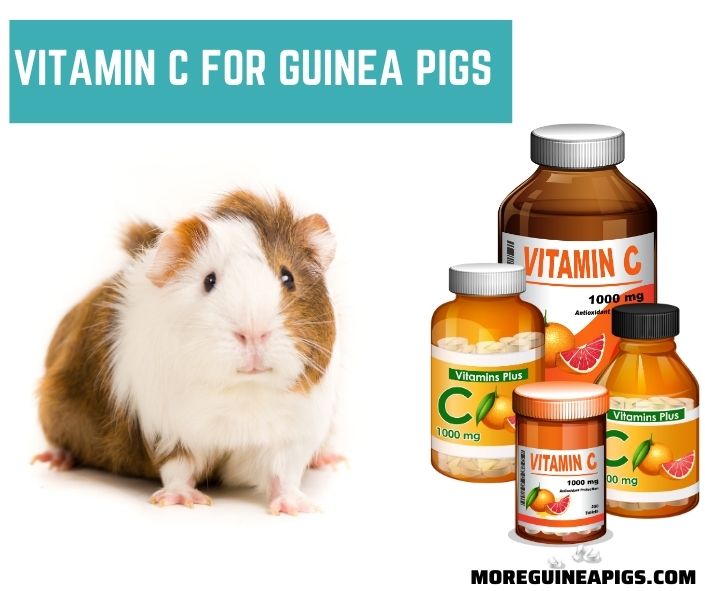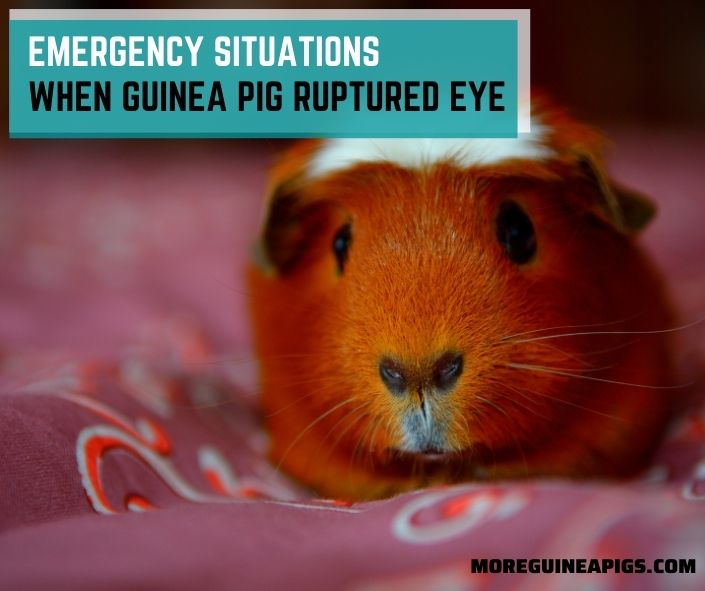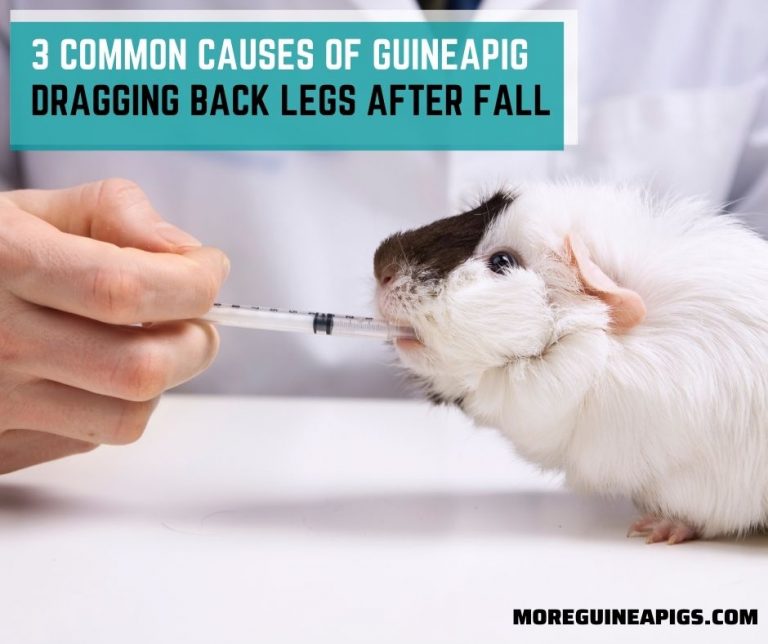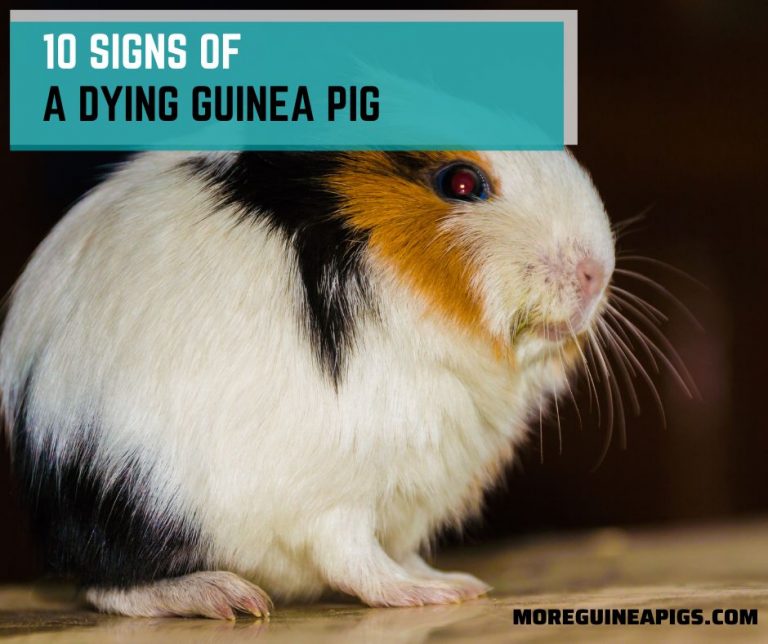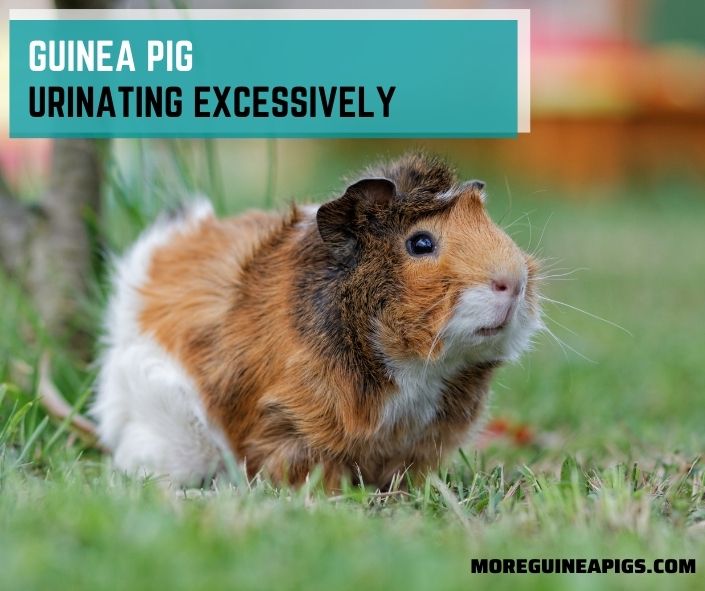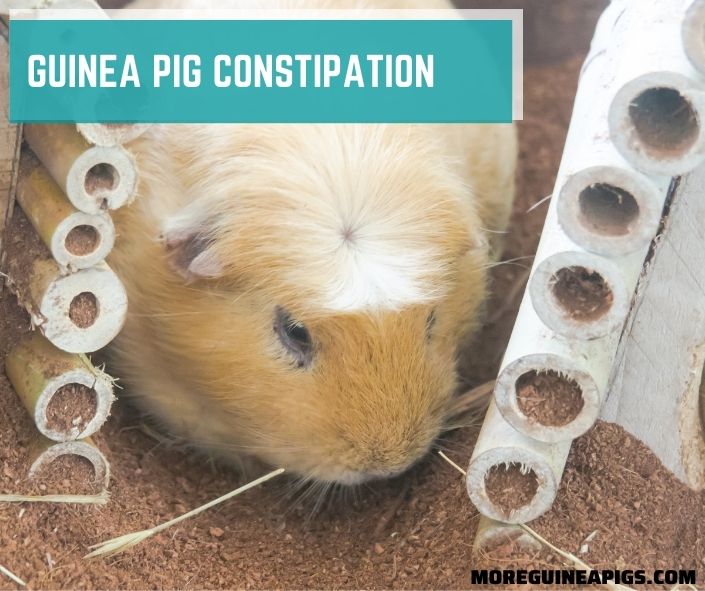Vitamin C For Guinea Pigs and 3 Best Ways to Offer It
One of the most important nutrients that guinea pig owners need to include in their pet diet is Vitamin C. This is because guinea pigs cannot produce their own vitamin C, and they can fall ill if you don’t provide it in their diet.
Like humans, guinea pigs can get their essential vitamin C from fruits, vegetables, and daily supplements.
The amount of vitamin C that your guinea pig needs per day is around 10-30mg/day. However, pregnant, young, and ill guinea pigs need more vitamin C per day.
In this article, we have highlighted everything you need to know about Vitamin C for guinea pigs, from ways you can include it in your piggy’s diet to what can happen if they lack vitamin C in their diet.
Role of Vitamin C for Guinea Pigs
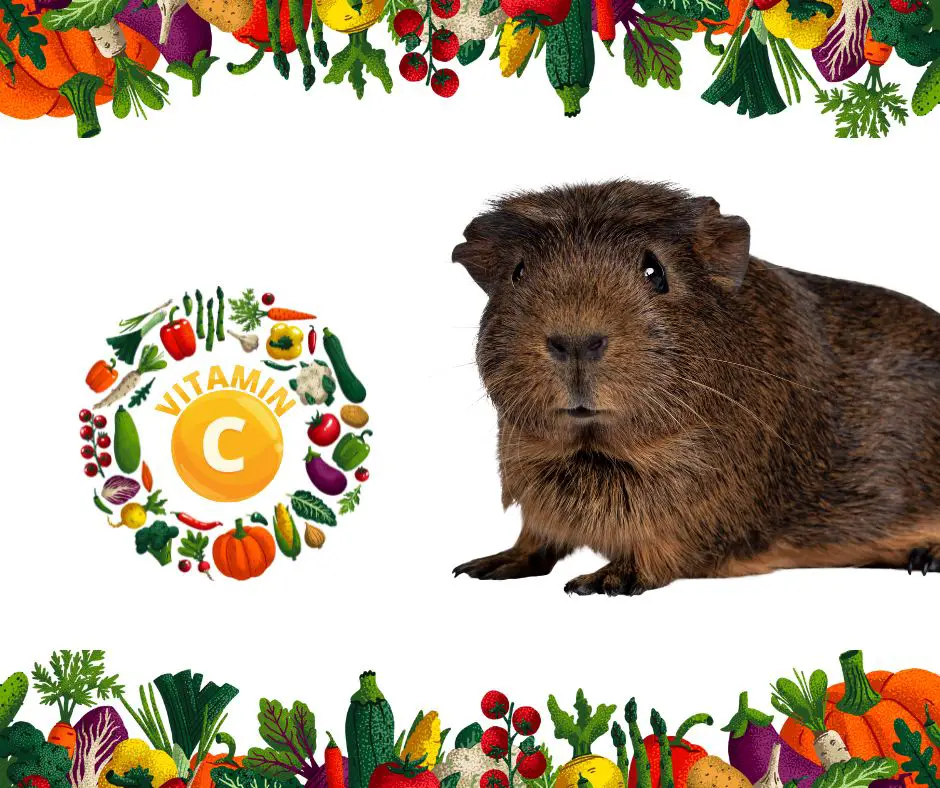
Vitamin C is an important nutrient for guinea pigs as it is used for making collagen, a building block for several body tissues. Guinea pigs need vitamin C for healthy gums, skin, and joints, and it also aids in the healing of wounds.
Vitamin C is also important for the immune system of a guinea pig to work properly. However, guinea pigs cannot produce vitamin C in their body, and it is recommended that you regularly supplement it in their diet.
How Often Do Guinea Pigs Need Vitamin C?
Guinea pigs will need between 10-20mg of vitamin C every day based on their condition. However, a guinea pig may need up to 50mg of vitamin C per day if it is unhealthy or deficient in vitamin C.
It is recommended that you consult with your vet to help determine the exact vitamin C that your guinea pig requires.
Although vitamin C is readily available in vegetables and fresh fruits, guinea pigs cannot consume enough to get the vitamin C they need every day.
Furthermore, the vitamin C in guinea pig pellets is relatively unstable and can break down or oxidize quickly.
This means you will need to offer an unlimited quantity of hay, vegetables, fresh fruits, and a smaller amount of vitamin C-fortified pellets every day to help ensure they get enough vitamin C.
How Long Can Guinea Pigs Be Without Vitamin C?
The supply of vitamin C in guinea pigs’ bodies will disappear rapidly if they don’t get enough vitamins in their diet. The signs that your guinea pig is lacking vitamin C will become noticeable within weeks.
Vitamin C deficiency also makes guinea pigs vulnerable to scurvy, a condition that interferes with the manufacture of collagen in a guinea pig’s body.
The health of a guinea pig suffering from scurvy can decline rapidly and they can die 6-8 days after losing 40% of their body weight.
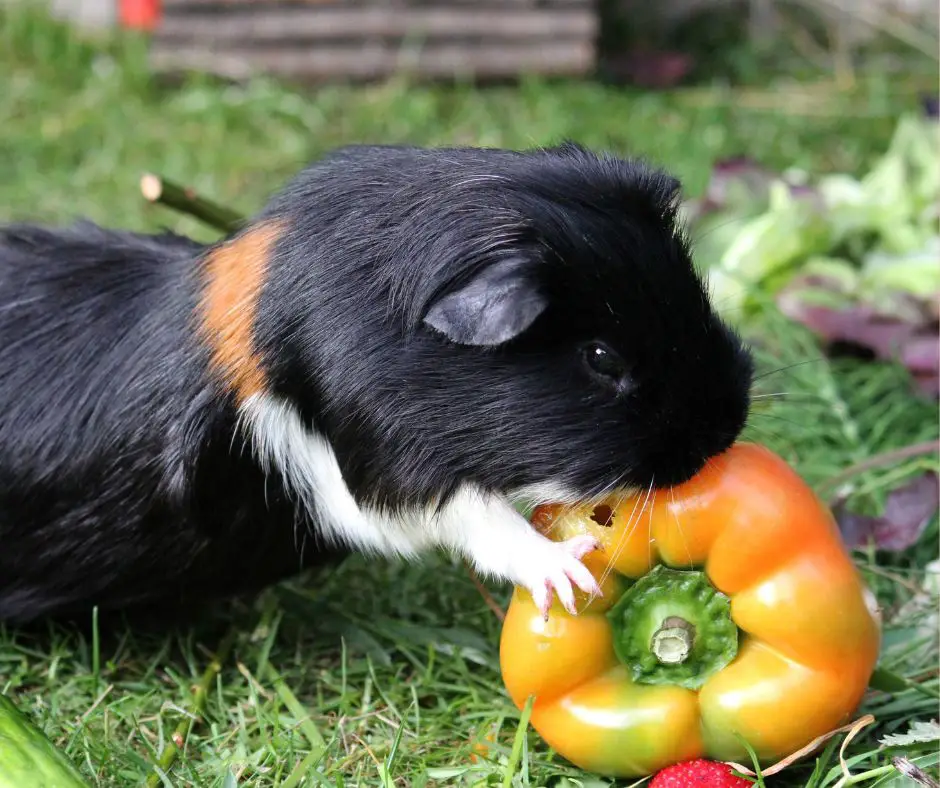
How Do You Offer Guinea Pig Vitamin C
In the wild, guinea pigs get their vitamin C from the leafy greens, vegetables, and fruits they eat. There are several ways that guinea pig owners can offer vitamin C to guinea pigs in captivity.
However, one of the simplest ways to offer vitamin C for guinea pigs is to offer them a varied diet of hay, fresh vegetables, pellets, fruits, and supplements.
Some ways to offer vitamin C for guinea pigs are stated below.
Feed a Good Selection of Vegetables That High In Vitamin C
One of the ways to offer vitamin C for guinea pigs is to feed them with vegetables rich in vitamin C. Dark and leafy greens like parsley, kale, dandelion greens, cabbage, spinach, lambsquarter, chicory, etc. are a good source of vitamin C.
It is recommended to use leafy greens as the main vegetable supplement for your piggies, and you can feed them with 2-3 leaves every day.
Avoid harvesting dandelion greens or lambsquarter from lawns treated with fertilizers, pesticides, or herbicides.
Note: various vegetables have different amounts of nutrients and vitamins. Although some vegetables are healthy for your guinea pigs, they can cause dietary issues if you feed them to your guinea pigs in high quantities.
This is why you should try to limit feeding some vegetables to your guinea pig to 1-2 times per week.
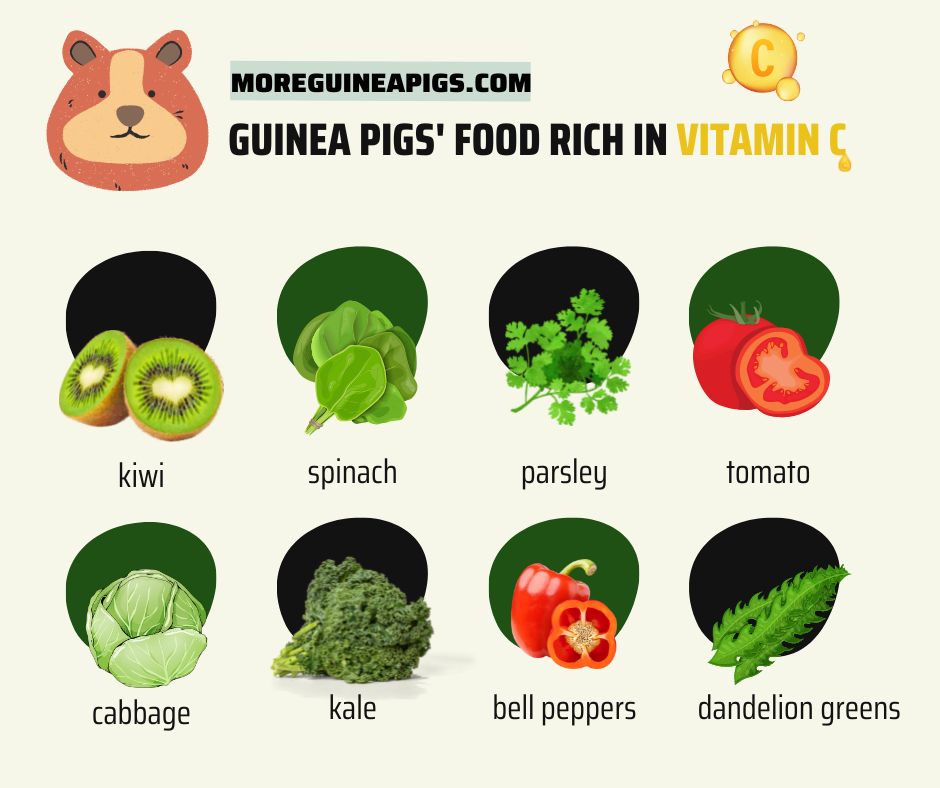
Also read: What Are Guinea Pigs Favorite Veggies?
Use Pellets
Pellets are another great way to offer vitamin C to guinea pigs. The best thing is to feed commercial guinea pig pellets to your guinea pig daily.
This is because most guinea pigs don’t overeat them, but you can reduce the number of pellets that you provide if your piggies are obese.
You can feed growing guinea pigs with alfalfa-based pellets, but you may need to opt for Timothy hay-based pellets for adult guinea pigs.
The main drawback with pellets containing vitamin C is that the vitamin C is quite unstable and will break down or oxidize quickly.
You will need to ensure that you use up or replace a pellet within 90 days after they are manufactured, or the vitamin C in the pellets may become degraded.
A good way to preserve Vitamin C in a pellet is to keep them in a cool dark place.
Note: Avoid buying pellets with nuts, dried fruits, beet pulp, corn products, or other fillers for your guinea pig. Furthermore, you should avoid feeding your guinea pigs with pellets with high sugar content and pellets with lots of preservatives.
Also read: 10 Best Guinea Pigs Commercial Food
Oxbow Animal Health Organic Bounty Adult Guinea Pig Food – All Natural Adult Guinea Pig Food – 3 lb.
Use Vitamin C Tablets
The most effective way of offering vitamin C to guinea pigs is by supplementing their food with vitamin C tablets. You can either use vitamin C tablets specifically made for guinea pigs or use human chewable 100mg vitamin C tablets.
All you have to do is ensure that you buy just vitamin C instead of a multivitamin formula. You can supplement a quarter of a 100mg tablet daily for most adult guinea pigs.
Guinea pig vitamin C tablets are usually 50mg, but since they are water-soluble, guinea pigs can excrete excesses over their daily requirement.
You can offer vitamin C tablets to your guinea pig like a treat and watch as most guinea pigs eat them. Another way to supplement vitamin C tablets is to crush them and then sprinkle them on vegetables or pellets.
Natures Aid Vitamin C Time Release 1000 mg, Immune Support, 180 Tablets
Avoid Vitamin C Drops
Although you may find water-based vitamin C drops in pet shops, it is not recommended to use them for your guinea pigs.
Vitamin C drops may look like a cool way to include vitamins in your cavy diet, but they are not very effective. Some of the reasons why you should avoid vitamin C drops are:
The concentration of vitamin C is usually low once diluted with water. This means your guinea pigs will need to drink lots of water before they can get enough vitamins they need in a day.
Water-based vitamin C is packaged in a clear bottle which exposes the vitamin C to light. However, vitamin C is sensitive to light, and it can lose its potency when exposed to light.
Vitamin C drops usually give water an odd taste, making your guinea pigs not drink its water. This means your guinea pig will not only get enough vitamin C in their body, but they can also get dehydrated.
Unless you are using a water bottle, guinea pigs may not get vitamin C for the day if they topple over the water bowls with the vitamins in them.
Guinea Pig Vitamin C & Health Issues
Vitamin C is an important nutrient for guinea pigs as it is important for their immune system and collagen, a building block for several body tissues.
However, guinea pigs can have health issues if you over supplement their diet with vitamin C or you don’t provide enough vitamin C in their diet.
Also read: 8 Disorders and Diseases of Guinea Pigs
Vitamin C Deficiency
Guinea pigs cannot produce vitamin C in their body. They can suffer from vitamin C deficiency if you don’t supplement their diet with vitamin C. Signs of vitamin C deficiency usually develop rapidly, and you will start to notice this within weeks.
Some of the signs of vitamin C deficiency in guinea pigs include:
- Depression
- Weight loss
- Loss of appetite
- Nasal discharge
- Swollen and painful joints and ribs
- Ruffled fur
- Bleeding gums
- Hemorrhages under the skin and in the joints
- Poor bone and teeth development with pain in the mouth
- Delayed wound healing and infections
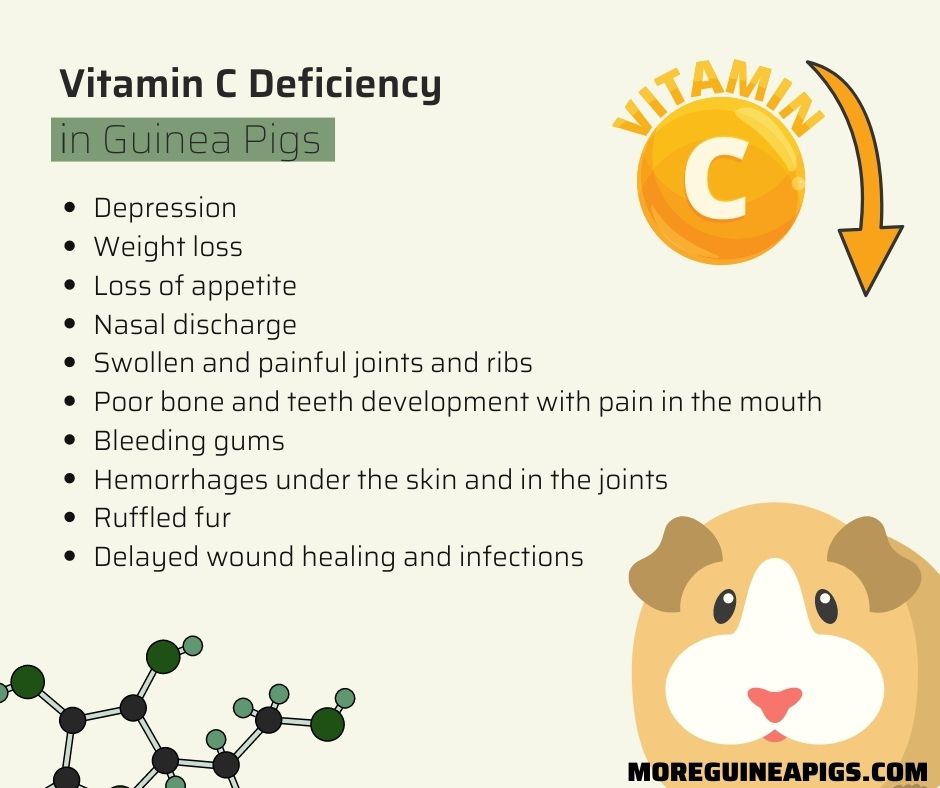
How To Treat Vitamin C Deficiency In Guinea Pigs
Vitamin C deficiency can be treated if identified early before the guinea pig becomes too ill. Owners can correct vitamin C deficiency by supplementing the guinea pig diet.
However, vitamin C injections and force-feeding may be needed if a guinea pig has a decreased appetite.
You can contact your vet to help determine the best course of action.
Vitamin C Overdose
Generally, vitamin C is soluble in water and does not accumulate in the guinea pig’s body. This means the guinea pig body will use what it needs, and the excess vitamin C will then be passed out through their urine.
However, guinea pigs can have serious health issues if you over supplement their diet with more than 10-30mg of vitamin C.
Feeding your guinea pigs with too much vitamin C for an extended period can lead to arthritis, kidney and bladder stones, and pseudo-scurvy. It can also cause poor growth and development in younger guinea pigs.
How To Deal Vitamin C Overdose In Guinea Pigs
Vitamin C overdose is not that common in guinea pigs, and you can easily deal with it by ensuring you supplement your cavy’s food with the correct dosage. You can also consult with your vet to help determine the best dosage for your guinea pigs.
ChildLife Essentials Liquid Vitamin C
Conclusion
Vitamin C is an important nutrient for guinea pigs, but their body cannot produce their own.
You should be able to provide the right amount of vitamin C for your guinea pig by giving your guinea pig a well-balanced diet with vitamin-enriched hay, good quality pellets, fresh vegetables, and fruits.
We will like to hear from you in the comment section if you have any comments or questions.
